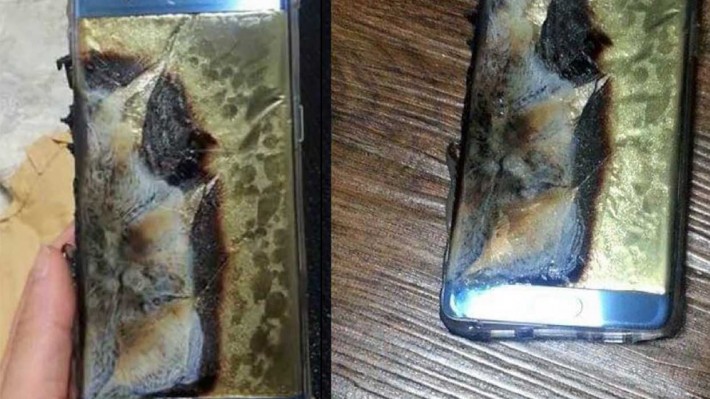Samsung to launch 'Fan Edition' of failed Note 7
New phone gets a ‘safety-enhanced’ battery that should 'calm the fans' of the original handset

A free daily email with the biggest news stories of the day – and the best features from TheWeek.com
You are now subscribed
Your newsletter sign-up was successful
Galaxy Note 7: Samsung to resell and recycle defected handset
28 March
Samsung is to recycle its Galaxy Note 7 smartphone after Greenpeace called on the company to deal with the defected handsets using environmentally friendly methods.
A blogpost from the tech giant revealed a three-phase plan to manage the 2.5 million units which were recalled last October, following reports of it spontaneously catching fire.
The Week
Escape your echo chamber. Get the facts behind the news, plus analysis from multiple perspectives.

Sign up for The Week's Free Newsletters
From our morning news briefing to a weekly Good News Newsletter, get the best of The Week delivered directly to your inbox.
From our morning news briefing to a weekly Good News Newsletter, get the best of The Week delivered directly to your inbox.
Samsung said it was committed to refurbishing and reselling the handsets, salvaging components to repair other smartphones and extracting metals using methods that won't have a negative impact on the environment.
According to the BBC, the South Korean firm had "faced pressure" from Greenpeace over the Galaxy Note 7. The environmental group had "lobbied the technology giant over its plans for the devices, launching a petition and staging global protests including at the Mobile World Congress event", said the broadcaster.
A spokesman for Greenpeace told the BBC that while the news was welcome, "Samsung must share as soon as possible more detailed timelines on when it will implement its promises, as well as how it intends to change its production system to make sure this never happens again".
However, ArsTechnica reports that "as far as we can tell", Samsung was never going to "'pull an Atari' and throw all these devices in a landfill".
A free daily email with the biggest news stories of the day – and the best features from TheWeek.com
It adds: "As early as November 1, the company said it was 'reviewing possible options that can minimize the environmental impact of the recall.'"
Reports of the iPhone 6S Plus rival catching fire emerged just two months after its launch, leading to the full recall. An investigation found a manufacturing issue with the battery was to blame.
Samsung suffered a loss of $5bn (£4bn) in profit over the fiasco, adds ArsTechnica, with revenue losses expected to be around $10bn (£8bn)
Samsung Galaxy Note 7 fires spark tougher battery laws
8 February
South Korea is ramping up efforts to monitor mobile phone battery safety after the Samsung Galaxy Note 7 fiasco.
A new policy will require electronics manufacturers to submit batteries for approval before they are placed in consumer devices, the ministry of trade, industry and energy announced.
Companies will need to send the government sample batteries, which will then be subjected to a tougher safety and quality inspection process.
However, the procedures will only be active for five years, as the ministry says it does not want to "delay the swift introduction of innovative battery technology in the market".
Ministers have introduced the policy after the Samsung Galaxy Note 7 was found to suffer from an internal battery fault that caused it to short-circuit and explode. The phone was recalled from the market and customers were given a full refund.
Samsung has since introduced its own eight-point safety process to monitor durability and carry out more rigorous charging tests on batteries.
Samsung Galaxy Note 7: Battery faults to blame for fires
23 January
Samsung has blamed the batteries used in its axed Galaxy Note 7 for causing the smartphone to spontaneously catch fire.
Revealing the reason for the first time today, the South Korean electronics company pinpointed design and manufacturing issues, with errors ranging from insufficient insulation materials to a lack of room for the battery's contact points.
Some batteries were found to have a deflected negative electrode in the upper-right corner of the battery that allowed the positive and negative electrodes to meet, causing fires. Others had abnormal welding points on the positive electrode that pierced the insulating material and caused direct contact with the negative electrode. A number of batteries were also reported as having a complete absence of insulating material.
Samsung mobile president DJ Koh says the company is "more than ever" committed to winning back the faith of its customers and that it has established "innovations" to help improve safety on its mobile devices in the future.
A new eight-step safety procedure includes monitoring device durability, X-ray inspections and more rigorous charging tests. Samsung will also carry out visual inspections and disassemble devices for further testing.
Reports of Galaxy Note 7 smartphones spontaneously catching fire begin a mere two months after it was released last summer. The company carried out a full recall in October and claims 96 per cent of devices have been returned for a refund.
The BBC reports the incident may have cost Samsung $5.3bn (£4.3bn) and was "hugely damaging" for the tech giant's reputation.
Samsung considers splitting in two
29 November
Samsung Electronics has announced it is considering splitting the company into two units, following plans to create a new governance committee of independent board members.
A decision will be made after it conducts a "thorough review" of the corporate structure, said the South Korean firm. It expects this to take six months to complete.
It also revealed plans to increase dividends and repurchase shares at the end of January 2017.
The BBC says a split would "simplify the company's structure" and clarify the "valuation of the firm's assets", while The Guardian reports it would allow heir-apparent Lee Jae-yong to take over from his father, Lee Kun-hee, and "address governance concerns".
Investors have pressed Samsung to establish a holding company to address its "complicated layers of cross-shareholdings with sister companies", adds the paper.
The news comes in the wake of the exploding battery fiasco surrounding the company's Galaxy Note 7, which was recalled in October, two months after its release. This resulted in $20bn (£16.3bn) being wiped off the value of the company in just two days.
Smartphone permanently pulled from company's line-up, sending shares tumbling
12 October
Samsung has permanently ceased production of its Galaxy Note 7 smartphone after less than two months on sale.
Reports of the device catching fire and exploding surfaced not long after it hit the shelves. The South Korean company issued a recall of all 2.5 million units in September and sent replacements it claimed to be safe. However, several of those have also spontaneously ignited, prompting the company to completely ditch the phone.
The BBC reports that a man in Kentucky "woke up to a bedroom full of smoke from a replaced device", while a domestic flight in the US was evacuated after "a new device started emitting smoke in the cabin". Passengers have been warned not to use their Note 7s during flights.
Owners are now being asked to back up their data, switch the smartphone off and return it to Samsung in exchange for a Galaxy S7, S7 Edge or a full refund. The device retailed for £739.
Samsung appears to be taking no chances, The Guardian says, and customers are being supplied with an elaborate fireproof kit containing several boxes and a pair of gloves to use to return their devices.
Investors have acted strongly to the crisis. Shares fell eight per cent on Tuesday, shortly before the announcement that production was stopping completely. That was followed by a further 0.8 per cent stumble on Wednesday morning.
In total, more than $20bn (£16.3bn) has been wiped off the value of the company in the space of two days.
Samsung now expects profits of £3.8 billion in the third quarter of 2016, a third lower than the company originally estimated, reports the BBC.
"Analysts are suggesting the Note 7 crisis could cost Samsung in the long run, particularly coming just as rivals, such as Google and Apple, have announced new high-end smartphones," adds the broadcaster.
The Note 7 was Samsung's most expensive device and one of the main rivals to Apple's recently revealed iPhone 7 Plus.
Samsung tells Note 7 owners to switch off phones
11 October
Samsung has told owners of its Galaxy Note 7 to switch off their smartphones while it investigates reports of the device catching fire.
The Korean tech giant issued a recall for 2.5 million handsets in September after a number of complaints about exploding batteries.
Affected owners were issued with replacement sets which Samsung said were safe. However, it is now being reported that several of these have also caught fire.

The BBC reports that a man in Kentucky "woke up to a bedroom full of smoke from a replaced device", and that a domestic flight in the US was evacuated after "a new device started emitting smoke in the cabin".
Owners are being advised to seek a full refund from the place of purchase or exchange their Note 7 for a different model entirely.
Samsung has officially suspended sales and production of the smartphone - actions that have led some to speculate it will scrap the device completely. According to Reuters, a "source familiar with the matter" says the company is weighing up a permanent halt in sales.
BBC technology reporter Dave Lee says the incident is a "disaster" for the company, which had insisted the replacement phones were safe as recently as yesterday.
"Perhaps even Samsung itself could not quite believe that one of the world leaders in electronics could have made such a catastrophic product safety error… twice," he said.
Lowell McAdam, the chief executive of US wireless carrier Verizon Communications, told the Wall Street Journal the issue is "a major black eye" for Samsung. "In my however many years in the market, I have not seen a recall like this," he said.
Samsung shares plunged eight per cent following the recall, says the Financial Times, wiping £15.5 billion off the company's market value.
The Note 7 is Samsung's most expensive handset and its strongest rival to Apple's iPhone 7 Plus, which could see sales boosted by today's news. The recall may also be a boon for Google ahead of the launch of its new Pixel XL phone.